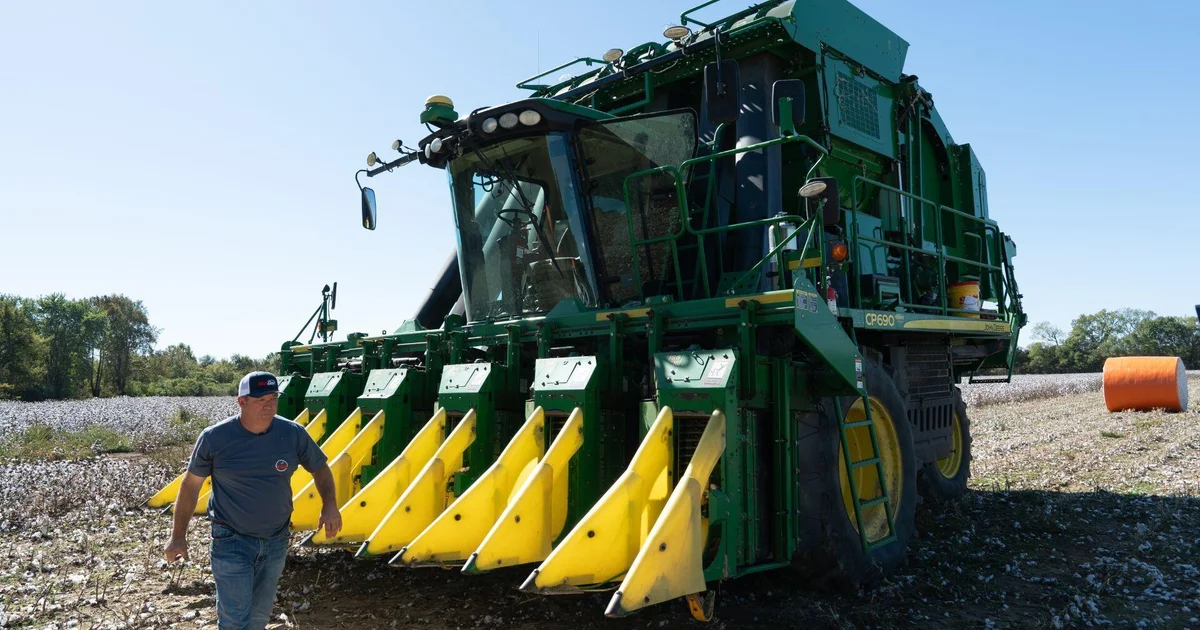Copyright cbsnews

Tennessee farmer Franklin Carmack is haunted by concerns that he could lose the family farm.Carmack, a fifth-generation farmer, has been forced to take on work outside his fields — selling T-shirts, driving trucks and repairing boats — to try and ease his financial burden. It's affected his health, Carmack said, and he now takes four blood pressure pills a day. He thinks about the issue when he goes to bed at night. "What's gonna be left in a year, two years? Am I the one that broke what started in the late 1800s?" Carmack said he wonders.He's not alone: America's farmers are facing high costs, low prices and challenges from tariffs. Major row crops, including corn, soybeans, cotton and wheat, have not been profitable since at least 2022, according to United States Department of Agriculture data.Farmer frustrations Carmack and longtime friend Jeffrey Daniels grow cotton, soybeans and corn on their respective family farms. This year, instead of showing off crops at the West Tennessee State Fair, the pair sold T-shirts, made from cotton they grew, in an attempt to offset their losses in the fields. They sold about 250 shirts for $35 each, but it was hardly enough.This year, they expect to lose nearly $800,000 combined.Times are especially tough now because of input costs: everything a farmer needs to pull income from the ground, such as seed, equipment parts and fertilizer. Those costs have increased by more than 30% in the last five years, according to USDA data. This is, in part, due to inflation and rising interest rates.Cotton farmers have struggled with dwindling prices and decreased global demand as clothing manufacturers use more synthetic fabrics."The morale in the farming industry, not just farmers, is the lowest I've ever seen," Carmack said. "Everybody's on edge."In the first six months of 2025, there were 57% more farm bankruptcies than during the same period last year, according to United States Courts.Tariffs and the promise of federal helpDaniels and Carmack say tariffs have made this year even harder. Soybeans have long been the largest U.S. export crop, worth nearly $25 billion last year, according to USDA. China, which primarily uses soybeans to feed its massive livestock industry, was the largest foreign buyer of America's soybeans.Sales ground to a halt in May when China stopped buying all U.S. soybeans as retaliation for President Trump's tariffs. Following a meeting last week with Chinese President Xi Jinping, Mr. Trump said the additional 100% tariffs on certain imports from China, which he previously said would take effect Nov. 1, will not be implemented.Tariffs have also impacted the prices farmers pay to buy equipment. "Anything that comes from China that's on that sprayer, there's a tariff and they're just going to pass it directly to us," Daniels said.Last week, Mr. Trump and Xi reached a one-year trade deal. But farmers said whatever comes next, the problems on farms run deep. "Do you just keep going, rolling the dice, hoping things will turn? I mean, it's not looking good," Daniels said.Mr. Trump has promised a new bailout for American farmers – as much as $13 billion that he said would be paid for by the tariffs."It will help pay some bills, but that's not fixing the problem. It's a Band-Aid when we need stitches," Carmack said.Carmack and Daniels, like many farmers 60 Minutes spoke with in Tennessee and Missouri, said they'd rather work their fields than rely on taxpayer money.High numbers of suicides among farmers Farmers 60 Minutes met with say there are also worries about suicide in agricultural communities. Concerns for neighbors rise when crop sales drop.The suicide rate among agriculture workers is three times higher than it is among the general working population, according ot the Centers for Disease Control and Prevention's most recent data in 2021. 60 Minutes' reporting shows that many rural mental health groups are seeing increased crisis calls to their hotlines. Jolie Foreman, who runs Shelby County Cares, a nonprofit organization focused on the high number of suicides among farmers, said her county has the highest rate of suicide per capita in the state of Missouri. The county has one therapist for about 6,000 people."[We] cannot really determine our success," Foreman said. "We only can calculate the losses."Though it's difficult to know how many lives have been saved, Foreman said she believes her program is working.In neighboring Macon County, Missouri, just a few miles away, there were two confirmed farm suicides this year. Foreman said she worries she could see an increase in the suicide rate because of the bleak financial situation for farmers. Shelby County Cares connects farmers with therapists, either in person or remotely. Foreman said walk-ins and calls to her office have increased since the beginning of the year. She's learned the best way to get farmers, who are traditionally stoic and fiercely independent, to talk is through their wives and through sharing food.Foreman said she personally knew farmers who took their own lives. "In my own family, we've definitely had tragedy and have lost some very, you know, important people in our own family," she said. Since the 1970s, Foreman's father-in-law, Brent Foreman, has lost three relatives — all farmers — to suicide. Two neighbors of the family farm also recently took their own lives."I've always had a fear for my kids and now my grandkids that we sure don't want history to repeat itself," he said. "You know, no matter how bad things get, things always have a way of working out. They'll always get better."Faith in Trump's planBrent Foreman and his son Jarrell grow more than 1,000 acres of soybeans and 650 acres of corn on a farm they manage themselves. They also raise more than 200 head of cattle, which means they are not reliant on soybeans as their sole source of income and can afford to wait for details on Mr. Trump's new trade deal."I have a lot of faith in him, and a lot of trust in him. And I think he's trying to make us the best deal he can for the whole country, but for the American farmer, for the long term," Brent Foreman said.Nearly 80% of voters in what are called farming-dependent counties voted for Mr. Trump in the last election, according to Investigate Midwest."I feel like a lot of American farmers, cattle people, it's a lot, a lot of people probably feel let down," Daniels said. "Maybe there's a method to the madness, you know, that's still to be seen."Many are now taking their frustrations directly to Republican lawmakers at town halls across the country. Carmack welcomed Mr. Trump to visit his farm. "I'd show him the daily life that I do from cleaning equipment, running equipment, dispatching trucks," Carmack said. "And then I'd hand him a stack of bills. And then I would show him the receipts, what I'm getting from my crop. He's a smart man. I'm not going to take that away from him. And it won't take him the five minutes to say, 'This isn't going to work.'"If you or someone you know is in emotional distress or a suicidal crisis, you can reach the 988 Suicide & Crisis Lifeline by calling or texting 988. You can also chat with the 988 Suicide & Crisis Lifeline here.. For more information about mental health care resources and support, The National Alliance on Mental Illness (NAMI) HelpLine can be reached Monday through Friday, 10 a.m.–10 p.m. ET, at 1-800-950-NAMI (6264) or email info@nami.org.Additional support for agricultural communities is available here.



